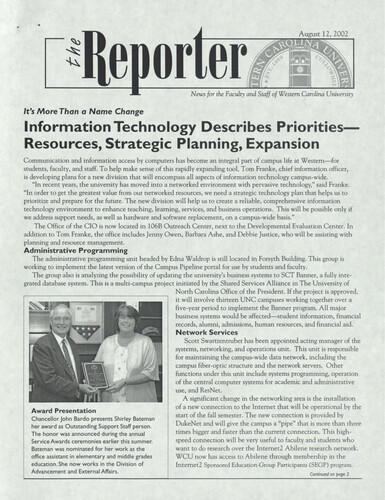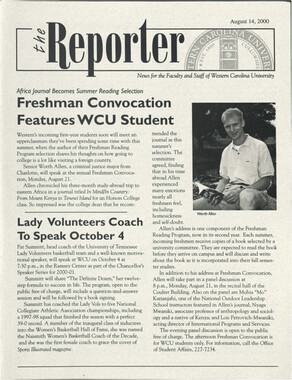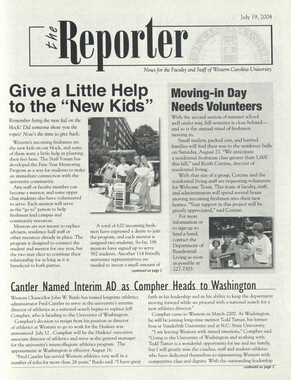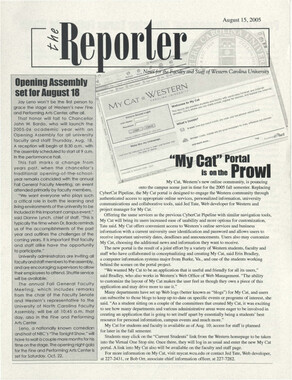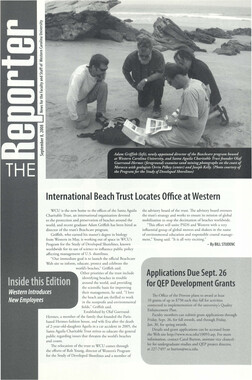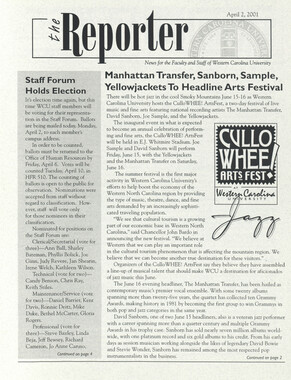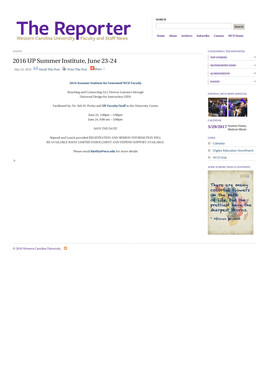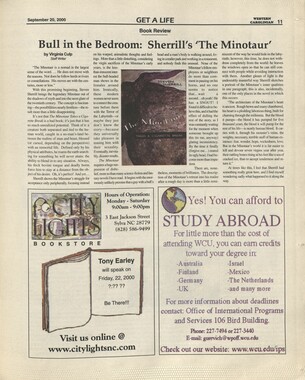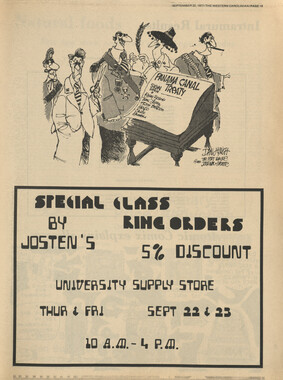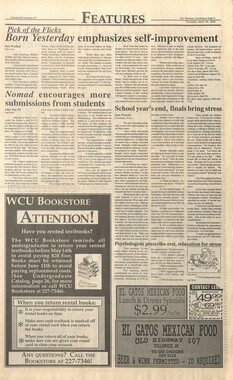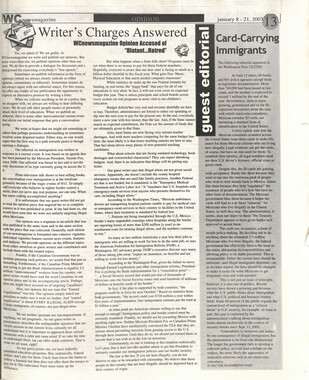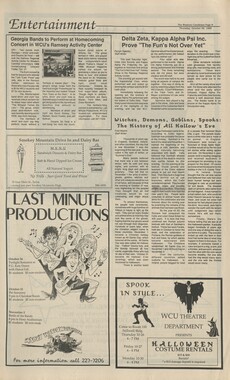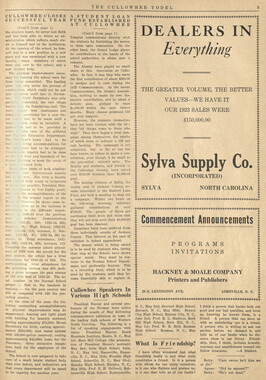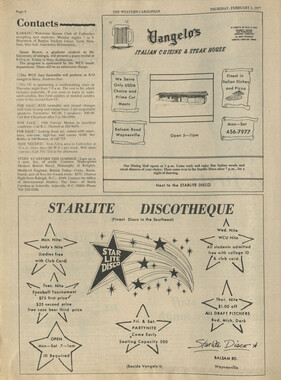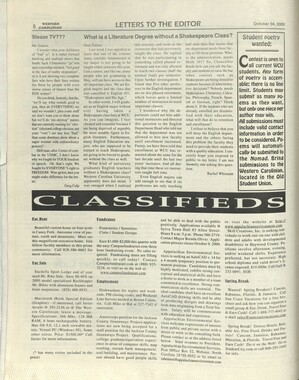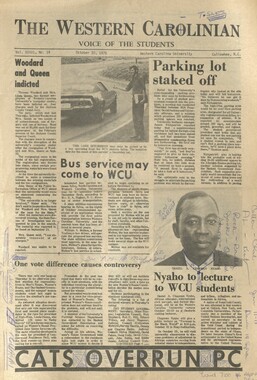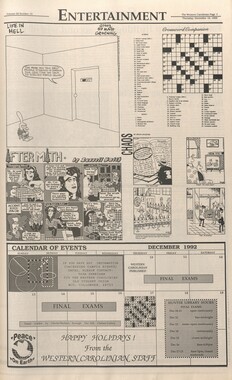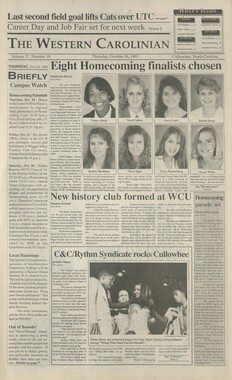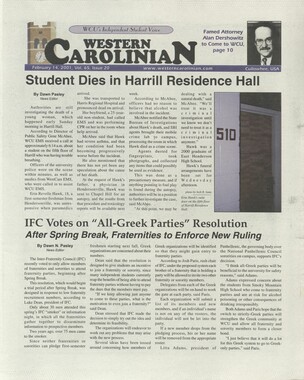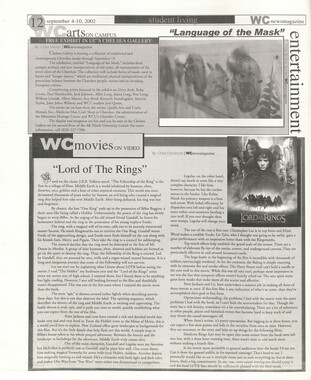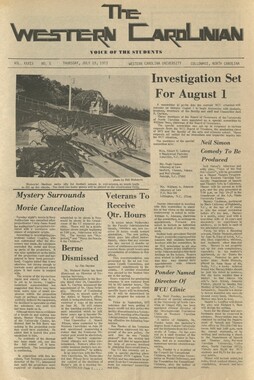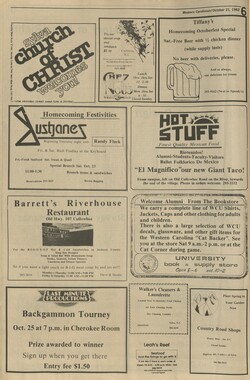Western Carolina University (20)
View all
- Canton Champion Fibre Company (2308)
- Cherokee Traditions (293)
- Civil War in Southern Appalachia (165)
- Craft Revival (1942)
- Great Smoky Mountains - A Park for America (2767)
- Highlights from Western Carolina University (430)
- Horace Kephart (941)
- Journeys Through Jackson (154)
- LGBTQIA+ Archive of Jackson County (19)
- Oral Histories of Western North Carolina (314)
- Picturing Appalachia (6679)
- Stories of Mountain Folk (413)
- Travel Western North Carolina (160)
- Western Carolina University Fine Art Museum Vitreograph Collection (129)
- Western Carolina University Herbarium (92)
- Western Carolina University: Making Memories (708)
- Western Carolina University Publications (2283)
- Western Carolina University Restricted Electronic Theses and Dissertations (146)
- Western North Carolina Regional Maps (71)
- World War II in Southern Appalachia (131)
University of North Carolina Asheville (6)
View all
- Allanstand Cottage Industries (62)
- Appalachian National Park Association (53)
- Bennett, Kelly, 1890-1974 (1295)
- Berry, Walter (76)
- Brasstown Carvers (40)
- Carver, George Washington, 1864?-1943 (26)
- Cathey, Joseph, 1803-1874 (1)
- Champion Fibre Company (233)
- Champion Paper and Fibre Company (297)
- Cherokee Indian Fair Association (16)
- Cherokee Language Program (22)
- Crowe, Amanda (40)
- Edmonston, Thomas Benton, 1842-1907 (7)
- Ensley, A. L. (Abraham Lincoln), 1865-1948 (275)
- Fromer, Irving Rhodes, 1913-1994 (70)
- George Butz (BFS 1907) (46)
- Goodrich, Frances Louisa (120)
- Grant, George Alexander, 1891-1964 (96)
- Heard, Marian Gladys (60)
- Kephart, Calvin, 1883-1969 (15)
- Kephart, Horace, 1862-1931 (313)
- Kephart, Laura, 1862-1954 (39)
- Laney, Gideon Thomas, 1889-1976 (439)
- Masa, George, 1881-1933 (61)
- McElhinney, William Julian, 1896-1953 (44)
- Niggli, Josephina, 1910-1983 (10)
- North Carolina Park Commission (105)
- Osborne, Kezia Stradley (9)
- Owens, Samuel Robert, 1918-1995 (11)
- Penland Weavers and Potters (36)
- Roberts, Vivienne (15)
- Roth, Albert, 1890-1974 (142)
- Schenck, Carl Alwin, 1868-1955 (1)
- Sherrill's Photography Studio (2565)
- Southern Highland Handicraft Guild (127)
- Southern Highlanders, Inc. (71)
- Stalcup, Jesse Bryson (46)
- Stearns, I. K. (213)
- Thompson, James Edward, 1880-1976 (226)
- United States. Indian Arts and Crafts Board (130)
- USFS (683)
- Vance, Zebulon Baird, 1830-1894 (1)
- Weaver, Zebulon, 1872-1948 (58)
- Western Carolina College (230)
- Western Carolina Teachers College (282)
- Western Carolina University (1794)
- Western Carolina University. Mountain Heritage Center (18)
- Whitman, Walt, 1819-1892 (10)
- Wilburn, Hiram Coleman, 1880-1967 (73)
- Williams, Isadora (3)
- Cain, Doreyl Ammons (0)
- Crittenden, Lorraine (0)
- Rhodes, Judy (0)
- Smith, Edward Clark (0)
- Appalachian Region, Southern (2393)
- Asheville (N.C.) (1886)
- Avery County (N.C.) (26)
- Blount County (Tenn.) (161)
- Buncombe County (N.C.) (1664)
- Cherokee County (N.C.) (283)
- Clay County (N.C.) (555)
- Graham County (N.C.) (233)
- Great Smoky Mountains National Park (N.C. and Tenn.) (478)
- Haywood County (N.C.) (3522)
- Henderson County (N.C.) (70)
- Jackson County (N.C.) (4692)
- Knox County (Tenn.) (25)
- Knoxville (Tenn.) (12)
- Lake Santeetlah (N.C.) (10)
- Macon County (N.C.) (420)
- Madison County (N.C.) (211)
- McDowell County (N.C.) (39)
- Mitchell County (N.C.) (132)
- Polk County (N.C.) (35)
- Qualla Boundary (981)
- Rutherford County (N.C.) (76)
- Swain County (N.C.) (2020)
- Transylvania County (N.C.) (247)
- Watauga County (N.C.) (12)
- Waynesville (N.C.) (68)
- Yancey County (N.C.) (72)
- Aerial Photographs (3)
- Aerial Views (60)
- Albums (books) (4)
- Articles (1)
- Artifacts (object Genre) (228)
- Biography (general Genre) (2)
- Cards (information Artifacts) (38)
- Clippings (information Artifacts) (191)
- Crafts (art Genres) (622)
- Depictions (visual Works) (21)
- Design Drawings (1)
- Drawings (visual Works) (184)
- Envelopes (73)
- Facsimiles (reproductions) (1)
- Fiction (general Genre) (4)
- Financial Records (12)
- Fliers (printed Matter) (67)
- Glass Plate Negatives (381)
- Guidebooks (2)
- Internegatives (10)
- Interviews (811)
- Land Surveys (102)
- Letters (correspondence) (1013)
- Manuscripts (documents) (619)
- Maps (documents) (159)
- Memorandums (25)
- Minutes (administrative Records) (59)
- Negatives (photographs) (5735)
- Newsletters (1285)
- Newspapers (2)
- Occupation Currency (1)
- Paintings (visual Works) (1)
- Pen And Ink Drawings (1)
- Periodicals (193)
- Personal Narratives (7)
- Photographs (12982)
- Plans (maps) (1)
- Poetry (5)
- Portraits (1657)
- Postcards (329)
- Programs (documents) (151)
- Publications (documents) (2237)
- Questionnaires (65)
- Scrapbooks (282)
- Sheet Music (1)
- Slides (photographs) (402)
- Sound Recordings (796)
- Specimens (92)
- Speeches (documents) (15)
- Tintypes (photographs) (8)
- Transcripts (322)
- Video Recordings (physical Artifacts) (23)
- Vitreographs (129)
- Text Messages (0)
- A.L. Ensley Collection (275)
- Appalachian Industrial School Records (7)
- Appalachian National Park Association Records (336)
- Axley-Meroney Collection (2)
- Bayard Wootten Photograph Collection (20)
- Bethel Rural Community Organization Collection (7)
- Blumer Collection (5)
- C.W. Slagle Collection (20)
- Canton Area Historical Museum (2110)
- Carlos C. Campbell Collection (282)
- Cataloochee History Project (65)
- Cherokee Studies Collection (4)
- Daisy Dame Photograph Album (5)
- Daniel Boone VI Collection (1)
- Doris Ulmann Photograph Collection (112)
- Elizabeth H. Lasley Collection (1)
- Elizabeth Woolworth Szold Fleharty Collection (4)
- Frank Fry Collection (95)
- George Masa Collection (173)
- Gideon Laney Collection (452)
- Hazel Scarborough Collection (2)
- Hiram C. Wilburn Papers (28)
- Historic Photographs Collection (236)
- Horace Kephart Collection (861)
- Humbard Collection (33)
- Hunter and Weaver Families Collection (1)
- I. D. Blumenthal Collection (4)
- Isadora Williams Collection (4)
- Jesse Bryson Stalcup Collection (47)
- Jim Thompson Collection (224)
- John B. Battle Collection (7)
- John C. Campbell Folk School Records (80)
- John Parris Collection (6)
- Judaculla Rock project (2)
- Kelly Bennett Collection (1314)
- Love Family Papers (11)
- Major Wiley Parris Civil War Letters (3)
- Map Collection (12)
- McFee-Misemer Civil War Letters (34)
- Mountain Heritage Center Collection (4)
- Norburn - Robertson - Thomson Families Collection (44)
- Pauline Hood Collection (7)
- Pre-Guild Collection (2)
- Qualla Arts and Crafts Mutual Collection (12)
- R.A. Romanes Collection (681)
- Rosser H. Taylor Collection (1)
- Samuel Robert Owens Collection (94)
- Sara Madison Collection (144)
- Sherrill Studio Photo Collection (2558)
- Smoky Mountains Hiking Club Collection (616)
- Stories of Mountain Folk - Radio Programs (374)
- The Reporter, Western Carolina University (510)
- Venoy and Elizabeth Reed Collection (16)
- WCU Gender and Sexuality Oral History Project (32)
- WCU Mountain Heritage Center Oral Histories (25)
- WCU Oral History Collection - Mountain People, Mountain Lives (71)
- WCU Students Newspapers Collection (1744)
- Western North Carolina Tomorrow Black Oral History Project (69)
- William Williams Stringfield Collection (2)
- Zebulon Weaver Collection (109)
- African Americans (388)
- Appalachian Trail (35)
- Artisans (521)
- Cherokee art (84)
- Cherokee artists -- North Carolina (10)
- Cherokee language (21)
- Cherokee pottery (101)
- Cherokee women (208)
- Church buildings (166)
- Civilian Conservation Corps (U.S.) (110)
- College student newspapers and periodicals (1830)
- Dams (95)
- Dance (1023)
- Education (222)
- Floods (60)
- Folk music (1015)
- Forced removal, 1813-1903 (2)
- Forest conservation (220)
- Forests and forestry (917)
- Gender nonconformity (4)
- Great Smoky Mountains National Park (N.C. and Tenn.) (154)
- Hunting (38)
- Landscape photography (10)
- Logging (103)
- Maps (84)
- Mines and mineral resources (8)
- North Carolina -- Maps (18)
- Paper industry (38)
- Postcards (255)
- Pottery (135)
- Railroad trains (69)
- Rural electrification -- North Carolina, Western (3)
- School integration -- Southern States (2)
- Segregation -- North Carolina, Western (5)
- Slavery (5)
- Sports (452)
- Storytelling (245)
- Waterfalls -- Great Smoky Mountains (N.C. and Tenn.) (66)
- Weaving -- Appalachian Region, Southern (280)
- Wood-carving -- Appalachian Region, Southern (328)
- World War, 1939-1945 (173)
The Reporter, August 2002
-
The Reporter is a publication produced by Western Carolina University featuring news, events, and campus community updates for faculty and staff. The publication began in August of 1970 and continues digitally today. Click on the link in the “Related Mate
-
-
August 12, 2002 News for the Faculty and Staff of Western Carolina University It's More Than a Name Change Information Technology Describes Priorities— Resources, Strategic Planning, Expansion Communication and information access by computers has become an integral part of campus life at Western—for students, faculty, and staff. To help make sense of this rapidly expanding tool, Tom Franke, chief information officer, is developing plans for a new division that will encompass all aspects of information technology campus-wide. "In recent years, the university has moved into a networked environment with pervasive technology," said Franke. "In order to get the greatest value from our networked resources, we need a strategic technology plan that helps us to prioritize and prepare for the future. The new division will help us to create a reliable, comprehensive information technology environment to enhance teaching, learning, services, and business operations. This will be possible only if we address support needs, as well as hardware and software replacement, on a campus-wide basis." The Office of the CIO is now located in 106B Outreach Center, next to the Developmental Evaluation Center. In addition to Tom Franke, the office includes Jenny Owen, Barbara Ashe, and Debbie Justice, who will be assisting with planning and resource management. Administrative Programming The administrative programming unit headed by Edna Waldrop is still located in Forsyth Building. This group is working to implement the latest version of the Campus Pipeline portal for use by students and faculty. The group also is analyzing the possibility of updating the university's business systems to SCT Banner, a fully integrated database system. This is a multi-campus project initiated by the Shared Services Alliance in The University of North Carolina Office of the President. If the project is approved, it will involve thirteen UNC campuses working together over a five-year period to implement the Banner program. All major business systems would be affected—student information, financial records, alumni, admissions, human resources, and financial aid. Network Services Scott Swartzentruber has been appointed acting manager of the systems, networking, and operations unit. This unit is responsible for maintaining the campus-wide data network, including the campus fiber-optic structure and the network servers. Other functions under this unit include systems programming, operation of the central computer systems for academic and administrative use, and ResNet. A significant change in the networking area is the installation of a new connection to the Internet that will be operational by the start of the fall semester. The new connection is provided by DukeNet and will give the campus a "pipe" that is more than three times bigger and faster than the current connection. This highspeed connection will be very useful to faculty and students who want to do research over the Internet2 Abilene research network. WCU now has access to Abilene through membership in the Internet2 Sponsored Education Group Participants (SEGP) program. Continued on page 2 Award Presentation Chancellor John Bardo presents Shirley Bateman her award as Outstanding Support Staff person. The honor was announced during the annual Service Awards ceremonies earlier this summer. Bateman was nominated for her work as the office assistant in elementary and middle grades education. She now works in th e Division of Advancement and External Affairs. Season Tickets Provide Best Deal Theatre Season Offers Exciting Variety Cullowhee may be a few miles from Broadway, but the lights shine brightly as the University Players offer evenings at the theatre with comedy, music, drama, and mystery during the 2002-2003 main stage theatrical season. Tartuffe (The Hypocrite) by Moliere, translated and adapted by Ranjit Bolt, will be presented evenings September 25-28, with September 28 and 29 matinees. Moliere's comic masterpiece will be directed by Claire Eye with a delightfully modern twist. A contemporary spin illustrates that a centuries-old play is still relevant. A family falls for a smooth-talking preacher who disrupts their lives and cheats them out of their money. The only way to salvage family and fortune is to expose the hypocrite for what he is—a devious scoundrel. The Kentucky Cycle by Robert Shenkkan details 200 years of Kentucky history as seen through the eyes of three families. Winner of the 1992 Pulitzer Prize, the play blends nine short plays into a sweeping epic beginning in 1775 when Cherokee hunters roamed the hills of the Cumberland Gap. Michael Rowen, an indentured servant from Ireland, watches his wife and children massacred by Indians. In return, he sets in motion a legacy of c orruption that will curse his valley and its people for generations. This is a tale of greed, sacrifice, murder, and betrayal. Stephen Michael Ayers will direct this play, which is divided into two parts. Part 1 is offered November 16 and 17 at 2 p.m. and November 20, 22, and 23 at 7:30 p.m. Part 2 is presented November 16, 17, and 21 at 7:30 p.m. and November 23 and 24 at 2 p.m. The third main stage production of the season will be The Fantasticks by Tom Jones and Harvey Schmidt, February 26-March 1 evenings with matinees March 1 and 2. The longest-running, most frequently produced musical ever will be directed by Dennis Jackson, who holds the new endowed professorship in musical theatre. The Fantasticks showcases a number of familiar show tunes, including "Try To Remember." Fathers meddle to make sure their children fall in love, including a phony kidnapping so the boy next door can be a hero and rescue his neighbor. Trouble ensues when the young lovers find out they have been manipulated. The final production is the light-hearted spoof Sinners by Norm Foster, April 23-26 evenings with April 26 and 27 matinees. Directed by Steve Carlisle, this comedy/mystery has it all—love, lust, death, and deception. She's beautiful, she's sexy, and she's married—to the preacher. There is her affair, a case of mistaken identity, murder times two, and a host of nosey parishioners and neighbors, all with their own little secrets. It's a funny, who-done-it, dark comedy. Evening performances begin at 7:30 p.m. with weekend matinees at 2 p.m. All productions are staged in Hoey Auditorium. The Theatre Patron Club offers multiple tickets for all main and second stage productions (depending on the level of membership) along with the opportunity to meet the cast and crew at a reception in the Hospitality Room of the Ramsey Center after the opening night performance of each main stage production. Club memberships start at $250 for two tickets. Proceeds from the Theatre Patron Club memberships provide special support for the University Players' activities. Season tickets for the four productions are a special price of $40 for Western faculty and staff, instead of the regular season ticket price of $50. Regular at-the-door prices are $12.50 for adults for each of the non-musicals and $15 for The Fantasticks. Student tickets are $6 each. For more information, to become a member of the Patron Club, or to purchase season tickets, call the Department of Communication and Theatre Arts at 227-7491. Information Technology continued from page I Client Services This area has been reorganized into two new areas: —Information Technology (IT) Services Dixie Lawson is the manager of this new unit and is responsible for operating the Help Desk, conducting IT workshops, and providing desktop support and consulting services. New Help Desk software and a new phone system are being implemented that will help IT services respond more effectively to calls. Callers will be asked various questions in order for staff to handle the call appropriately. This information also will let staff members collect data on the types of calls coming into the unit. —Academic Computing Support Services and Computer Repairs The academic computing support services staff will focus on assisting instructional users on campus. Faith Dabney has been appointed acting manager of this unit. This area includes management of the general student computer labs and the electronic classrooms. Computer repairs, currently part of this new unit, will continue to provide services for all university-owned IT equipment, not just instructional IT hardware. Jeff Kiska from Hunter Library will serve as interim lab coordinator. "During the fall semester, we will be seeking input on how to best implement these changes in order to support university needs," said Franke. Information Technology Phone Numbers Office of Chief Information Officer Tom Franke: 227-7282 IT Services Questions/Staff: 227-7ITS (7487) A u g u s t 1 2 , 2 0 0 2 • T h e R e p o r t e r uu Calendar August 12-25, 2002 Look for regular updates on the university's Web site at www.wcu.edu/cal.html Monday, August 12 New faculty orientation, 8:30 a.m.-4:30 p.m., beginning in MHC auditorium. (227-7495) Tuesday, August 13 New faculty orientation, 9-11 a.m., 1-3 p.m., and 3:15— 5 p.m., 105 and 202 Coulter. (227-7495) Wednesday, August 14 New faculty orientation, 9 a.m.-noon and 1:30-4:30 p.m., Room 186, Hunter Library. (227-7495) Thursday, August 15 Reception and general faculty meeting, 8:30-11 a.m., RH. (227-7100) Deans' meetings with department heads, 1-4 p.m. (227-7495) Part-time faculty orientation, 1-5 p.m., MHC. (227-7495) Registration in Asheville, 3-6 p.m., Karpen Hall. (828-251-6642) Friday, August 16 College faculty meetings, 9:30-11 a.m. Departmental faculty meetings, 11 a.m.-12:30 p.m. Open faculty assembly, 1:30-3 p.m., Killian 104. (227-7495) Saturday, August 17 Residence halls open to freshmen only. (227-7303) Saturday, August 17- Sunday, August 18 Orientation—for new students. (227-7234) Sunday, August 18 Orientation—for transfer students. (227-7234) Residence halls open for all students. (227-7303) Advising for transfer students, 10:30-11:30 a.m. (227-7170) Registration for transfer students, 11:30 a.m. (227-7232) Advising for freshmen, 2:30- 3:30 p.m. (227-7170) Registration for freshmen, 3:30 p.m. (227-7232) Monday, August 19 New graduate student orientation, 8:30 a.m.-l p.m., RH. (227-7398) Registration and drop/add in Cullowhee, 9 a.m.-4 p.m. (227-7232) Workshop—graduate teaching assistants, 1:30-3 p.m., RH. (227-7398) Valley Ballyhoo, 5 p.m., UC lawn. (227-7206) Classes begin, 5 p.m. *** Now Showing ••• Exhibitions: North Carolina Women Making History, the trials, triumphs, and changing roles of women during the past 400 years. Through May 2003. MHC. (227-7129) Let's Play, a look back at the ways Americans enjoyed leisure time at the turn of the twentieth century. Through September 6. MHC. (227-7129) Migration of t he Scotch-Irish People. (permanent exhibition). Information, illustrations, artifacts, and murals. MHC. (227-7129) Key: $ - Admission fee; HA - Hoey Auditorium; HFR - H.F. Robins on Administration Building; HS/CF - Hen non Stadium/Childress :ield; MHC - Mountain Heritage Center; NSA - Natu ral Sciences Auditorium; RRAC - Ramsey Regional Activity Ce nter; RH - Recital Hall, Coulter Building; BB - Belk Buildi ng; UC - A.K. Hinds University Center; UOC - University Outreach Center; WS/BW - Miitmire Stadium/Bob Waters Field; SSF - Shrader Soccer Field. Thursday, August 22 Faculty Senate meeting, 3-5 p.m., Hospitality Room, RRAC. (227-3321) Friday, August 23 New faculty orientation, 3:15-5 p.m., Hospitality Room, RRAC. (227-7495) Sunday, August 25 Spring into Summer program— A natural history series for children and adults presents "Bugs in the Creek." No charge, but reservations required, 2:30 p.m., MHC. (227-7129) Reporter Now Web Accessible Starting with this issue, the Reporter will be accessible online along with printed copies that are distributed on campus. When possible, the online version will feature color photos. A campus-wide e-mail will be sent indicating the new issue is available and a link will be provided. You also may reach the newsletter from the Western homepage through news and publications. Submissions: Send news items and calendar notices to WCU Calendar, 1601 Ramsey Center, Western Carolina University, Cullovuhee, North Carolina 28723 or e-mail to Reporter@email. wcu. edu. Submit items for the university's calendar online at least one week prior to the event. A u g u s t 1 2 , 2 0 0 2 • T h e R e p o r t e r Police,Traffic Office Moved; Vehicles Need Parking Permits The operational office for university police and traffic services has moved to the ground floor of the H.F. Robinson Administration Building in preparation for renovations at the Jordan-Phillips Fieldhouse. University police will be occupying the space formerly utilized by auxiliary services, and traffic services will be located in what was the mail room. Renovations of the fieldhouse are anticipated to be completed next summer. With the move, university police has expanded the visitor and short-term parking area located beside the Mountain Heritage Center to accommodate police vehicles and traffic customers. Additional spaces were added in the lot, so no spaces were lost. Police will strictly enforce parking in the visitor and short-term parking spaces, said Gene McAbee, director of university police and traffic services. Reminder Vehicle registration continues through the beginning of the fall semester. New parking permits must be displayed on your car by 8 a.m., Thursday, August 22. Parking permits are $40 for faculty and staff, and a transferrable permit is an additional $ 1 for each additional vehicle. Drivers must provide auto insurance information per new state law. Silent Meditation Group To Begin Sessions Counseling and Psychological Services will begin offering weekly, half-hour meditation sessions for beginning and experienced meditation practitioners starting Thursday, September 12. Focus of the group is silent sitting practice. Meditation may be used for relaxation, stress management, or spiritual practice. The group meets Thursdays, 12:15-12:45 p.m., at the Counseling Center in 116B Scott Hall. The first session will include half an hour of instruction for beginners. For more information, call Beth Johnson at 227-7206 or June Wytock at 227-7469. 2002 Faculty and Staff Fund Drive Celebrates Success Thanks to the generosity of the Western family, the 2002 Faculty and Staff Fund Drive was deemed a huge success. Overall participation increased from 28 percent to 31 percent with more than $100,000 raised for the university. "We are thrilled with this year's increase," says Tori Ellison, director of annual giving. "It is wonderful to see that so many faculty and staff members believe in and support Western" While the 2002 Faculty and Staff Fund Drive has come to a close, a contribution to support a program, department, or college is always welcome. Contributions can be made at any time during the year-including payroll deduction. For more information, contact University Advancement at 227-7124. The Reporter is published by the Office of Public Information. Debie Connelly, editor. Mail faculty/staff notes, events, notices, and changes of address to The Reporter, 1601 Ramsey Center, or send them via e-mail to Reporter@email.wcu.edu. Reporter Office of Public Information Publications Unit 1601 Ramsey Center Cullowhee, North Carolina 28723 NON-PROFIT ORG. U.S. POSTAGE PAID CULLOWHEE, N.C. PERMIT NO. 1 A u g u s t 1 2 , 2 0 0 2 • T h e R e p o r t e r Reporter JL News for < August 26, 2002 News /or the Faculty and Staff of Western Carolina University Welcome to the 2002-2003 Academic Year Remarks from the August 15 General Faculty Meeting* Dr. John W. Bardo, Chancellor Welcome back to the new year! 1 want to give a special welcome to our new faculty members. We are very glad you are here. This morning, I want to further elaborate on some of the items 1 mentioned in the spring regarding direction and institutional development. Before 1 do, however, I also want to let you know where we are with enrollment and with the budget situation. Overall, enrollment looks reasonably good. We will have a larger freshman class than last year. Things don't actually settle out until the fourth or fifth class day, but we expect between 1,230 and 1,240 freshmen. The average SAT should be about 1012 and the average high school GPA is creeping up. Last week, the average student entered with a GPA of more than a 3.25 (but remember, this will change). Our Honors College should have around 125 freshmen with an average SAT above 1235. Our overall enrollment should be up, with the vast bulk of the growth in off-campus graduate programs in Asheville and distance education. We will not know our final enrollment for two more weeks, but we should be up and total enrollment could be the highest in the institution's history. Despite the overall growth, our undergraduate enrollment will be flat. The lack of growth in our undergraduate program has significant implications for us, and we need to be very cognizant of them. The state wants us to grow our undergraduate program, and there are significant expectations that we will. At the same time, growth of our off-campus programs indicates increased attention to the region and its educational needs. More on this later; let's turn to the budget. Both houses of the Legislature have treated us reasonably well given the state s economic issues. In fact, if th e budget holds as written by both houses we should be in reasonably good shape going into the year. 1 need to mention just a few elements that are yet to be settled. First, the potentially bad news: the House budget funds all salary categories at ninety-eight percent. This means legislators are assuming that there will be salary savings from turnover of at least this amount. For us, this is a problem because these savings are what we use to buy academic equipment at the end of the year. We are going to work with President Broad and the Board of Governors to see if we ca n't get this provision changed. Now, the good news. Western, as you may recall, is a "focused growth institution." This means that we are expected to take actions that will cause us to grow significantly over the next several years. Both budget proposals call for cuts in the University of between 2.4 and 3 percent. However, both budgets also recognize that the focused growth institutions need to have funding if they are to achieve growth. Therefore, both budgets replace most of the cuts for the seven focused growth institutions with one-time money (this does not include the two percent cut in the House budget). What this means is that we should be able to handle any layoffs from vacant positions that have accumulated because of the hiring freeze. It also is important that neither house chose to attach local tuition to offset the fall in state revenues. Both legislative staff and some legislators recommended that the local The state wants us to grow our undergraduate program, and there are significant expectations that we will. At the same time, growth of our off-campus programs indicates increased attention to the region and its educational needs. continued on pae[<-' 2 *Please note: This issue includes written texts excerpted from addresses given at the August 15 General Faculty Meeting; they will vary slightly from the versions as delivered. The texts of speeches by Drs. Bardo and Smith, as well as comments by UNC Faculty Assemby Delegate Dr. Mary Adams, appear in full on Western's Web site. Our growth is now mandated in the focused growth plan, we have been given significant capital funding to assist us, and it is now up to us to take those actions that will actively and specifically promote enrollment growth. tuition be taken as state funds. This issue has been discussed in the Legislature ever since the local tuition was first approved. In prior years, we had not sought local tuition because of the pressures in the Legislature to rescind it. Had this occurred, given our lack of enrollment growth, we would have been in very bad shape. This would have been especially true if we had used the funds for faculty salaries. In that case, the funds from local tuition would have been allocated, so we would have had to cut a significant number of positions to return the equivalent amount of money. I did not, and do not, think that we could have sustained cuts of that magnitude. That is why we did not seek a local tuition prior to this year. Now things have stabilized somewhat. It appears that local tuition is safe even in this very down economy. You also should be aware that President Broad has opened the potential to modify our plan for the use of lo cal tuition. I intend to seek permission to modify our plan. First, we have been working to eliminate the so called "seventy percenters" who teach many of our freshmen classes. We will eliminate those positions and replace them with "visiting lecturers" as originally planned. These faculty will have higher salaries than the seventy percenters, and they will receive state benefits. Second, since there are no state funds for raises, we will need to work within existing university resources to provide faculty raises. Currently, 1 know only of sources of funds for "teaching faculty," but we are looking to see if we ca n find money to support our library faculty as well. The Board of Governors is working on a set of guidelines for use of funds for raises, so the specific process we use will need to follow their guidelines. However, I would anticipate that we will try to use a flat dollar base salary adjustment model since all disciplines on this campus have average salaries below the salary targets based on our official institutional peer group. While this increase will represent a "base adjustment," it will not be available to anyone whose performance was less than satisfactory. There also will be some limitations based on contract deadlines and appointment type, but nearly all full-time continuing faculty members will receive the base adjustment. Please also understand that it will be some months before the adjustment can be processed. The budget is not settled, so we do not have a final funding figure to work with. And any local decisions regarding adjustments will have to be approved by the Board of Governors, given their current policies. The earliest the adjustment could appear is at the end of November, and it could be the end of December. However, it is my i ntent that this adjustment be retroactive to July 1. I hope that you understand that we are able to make some of these moves because Western has begun to grow. Because the state funds nearly all academic operations of the university on enrollment, growth brings flexibility. Enrollment stagnation brings decline. Lack of enrollment growth over nearly thirty years has colored every aspect of our academic programs and, importantly, it has affected both your salaries and your support funds. In North Carolina, faculty positions follow enrollment. Loss of students means loss of faculty. Because we grew last year—and every indication is that we will grow this year, as well—we are in a position to begin to positively affect your conditions of employment. Our growth is now mandated in the focused growth plan, we have been given significant capital funding to assist us, and it is now up to us to take those actions that will actively and specifically promote enrollment growth. As I mentioned in the spring, I plan to meet with small groups of faculty members over the course of this semester to hear from you about some of the most critical issues that we are facing as an institution and to get a sense from you as to how you feel we should proceed. Today, I want to spend some time with you laying groundwork for that discussion. As I ha ve talked informally with various faculty members this summer, I heard five interesting themes that might be the basis for the next cycle of university development. These themes do not represent conclusions, but they are presented simply to suggest some avenues for exploration. You may have others. Please bring them forward and suggest them. First, several faculty members have discussed with me the potential for an institutional theme around "mountain culture." That is, we should consider tying significant aspects of the curriculum more closely to mountain history, cultures, music, arts, and crafts. If this theme were adopted, it obviously would have significant implications for new hires and replacements in our arts and humanities programs. A second theme involves the mountain environment. This theme seems to focus more on environmental science, integration of environmental issues in various curricula, and notions of support for sustainable development. This theme is particularly interesting because of the recent approval of our environmental science degree and recent work in the A u g u s t 2 6 , 2 0 0 2 • T h e R e p o r t e r department of chemistry to develop a strong bioinformatics base. There also seems to be some interest in English in focusing on environmental literature. A third theme that is of clear interest is continuing to expand our programs related to teacher education. This, of course, is our deepest tradition and it is of critical importance to the state. A fourth theme involves helping increase the income of the region by supporting sustainable economic diversification. Our work in technology and some of the key developments in the engineering technology program will support this theme, as will the developing curricula in hospitality, tourism, and recreation. Also, new leadership in the College of Business should allow us to focus more clearly on this issue as it affects regional business development. Unless North Carolina regains a strong economic base, and unless Western North Carolina develops such a base, we will see our educational resources erode and all our other plans will be lost. The fifth theme involves health and gerontology. Given the aging of the population in this region and our strong health-related professions programs, one could see how this theme could move us forward. As you are considering next steps, and especially if you a re thinking about institutional themes, I would encourage you to consider some important issues. First, if we as an institution adopt a theme, it becomes a very important part of our institutional strategic positioning. This means that Rick will allocate resources to help achieve this theme and departments that can include a theme in their curriculum will be encouraged to do so. It also has implications for the structure of the major in departments. Unless we actually implement the theme, claiming it will be of little value. Second, adopting a theme will not necessarily produce new faculty positions or resources. Resources follow enrollment, not thematic development. Therefore, we must assure that our themes are of interest to the broad potential student population. And we must assure that we are willing to implement the theme by restructuring what we do within existing resources. I wou ld hope that you would ask yourself the question: "If this theme is adopted, will our current curriculum support it; if n ot, are we willing to change the curriculum to support the theme?" The third question involves narrowness or broadness of the theme. We need to guard against being too narrow since it will be impossible to hire faculty or draw students. We also need to guard against being too broad. For example, having a theme of "culture" can mean almost anything and justify any action (since all learning is culture, the term covers everything that we teach in any university). I wa nt to conclude this talk with a more full discussion of a theme on which I be lieve that we still have consensus, but which seems to have gotten somewhat lost in the rhetoric of the last year. That theme involves increasing academic excellence and "raising the bar." Since this issue was first discussed in 1996, we have made very significant strides in raising standards and increasing our academic expectations. But as you visit around the region, you undoubtedly hear that we have not yet broken the back of this issue. Western had allowed its academic standards to wander a bit. This wandering resulted in low admissions standards, stagnated enrollment, and a los s of academic reputation. You should be aware that alumni are very proud of the efforts you are making to improve quality while you increasingly work to keep Western's tradition of meeting the needs of the people alive. But as you move around the community, you will still hear that our academic reputation is not where it needs to be. Together we have made progress, but we have not yet regained the academic stature that must define this institution. We must continue to focus on the tradition of academic excellence. As we consider the future, we need to add another dimension to the mix: Western is a "focused growth" institution. The state of North Carolina expects that we will grow to approximately 9,500 students over the next seven to eight years. They are putting resources into the institution to help us grow, and they are watching our actions very closely. As a focused growth institution we are expected to increase the number of students in our current majors, to make sure that all our programs are of the highest quality, and to take those actions that are necessary for us to achieve our enrollment targets. I th ink that most of us are aware of the designation as "focused growth," but I am not sure that we feel any urgency in taking actions that will cause us to achieve this growth. Because of the high visibility that being a focused growth institution brings, failure is not an option. Failure will erode any positive feelings that the state has about Western and what we are doing. As we consider our future direction, it is very important to remember that university course offerings and curricula are always changing. The knowledge explosion is not occurring just within Because of the high visibility that being a focused gro wth institution brings, failure is not an option. Failure will erode any positive feelings that the state has about Western and what we are doing. T h e R e p o r t e r • A u g u s t 2 6 , 2 0 0 2 . . . teaching and learning must be considered two sides of the same concept. That is, there can be good teaching only when there is learning. Otherwise, there is no teaching. a particular traditional discipline; there are whole new disciplines emerging. I would expect that twenty years from now the program mix at universities in the country will reflect most of the changes that we are seeing today. We must incorporate these programs if we are to succeed, and, more importantly, we must assure that our existing programs evolve their content and pedagogy to meet the current needs of the people. Now, let's get to the core—teaching and learning. What is quality teaching? What does it mean to have high standards? There is no secret to excellence in teaching. It involves reaching out to the students, pushing them to achieve, and helping them reach their full potentials. In fact, teaching and learning must be considered two sides of the same concept. That is, there can be good teaching only when there is learning. Otherwise, there is no teaching. Second, there must be excellence within the major. A strong academic degree is composed approximately equally of liberal education, the major, and student electives. While there are probably some professional programs that can't achieve this standard, we need to recognize that reducing students' ability to intellectually explore may well reduce the value of their education. A well-articulated major based in the best current understanding of what students need is paramount. This does not mean simply adding more courses to integrate "cutting edge" material but, instead, rethinking what is important. A program with academic excellence allows a student to graduate in a timely manner while encouraging that student to go on and develop a deeper understanding of the field. An excellent major does not look backward or remain stagnant. It does not pile requirement on requirement. A vibrant, meaningful curriculum that is well-articulated and focused on student learning should be able to prosper. Academic excellence means that we identify our best and brightest students and encourage them to go to graduate school. As a comprehensive university, we must recognize that our graduate programs will serve principally our own undergraduates and other people who live in our primary service region. If we can't structure a program to serve these people, and to serve them very well, then we will need to focus our attention and our limited resources elsewhere. Excellence in graduate education is a key to our future, and we need to encourage our best students to stay with us to get their first graduate degree. Excellence also requires us to engage in public service. Of the three parts of the institution's mission, this is the one that is most often misunderstood. Being on a committee is not service—it is citizenship; it is the price of shared governance. Public service means reaching out to communities beyond the campus and engaging in work that supports their development and addresses their needs. Service means bringing your professional expertise to the people in practical, real ways. Excellence also focuses on helping students graduate. Every time a student drops out of school, every time a student transfers, it hurts the university. People's perceptions of its academic excellence are what will drive this institution's future. When a high percentage of students who could stay at a university leave, it is seen as reflecting poorly on academic quality. So, an excellent university works hard to integrate students into its social and academic life. It also assures that every academic program is modern, compact, articulated, and outcomes-centered. There is one other thing that we know about excellence: Achieving it is not easy. It is hard work. It means examining received wisdom to separate truth from myth. It means linking one's work to that of broader constituencies and, at the same time, realistically examining what one is doing to assure that it really represents quality. Being average is easy, but being excellent? Now, that is the challenge! As I meet with groups of faculty, I would like to hear from you regarding how you think we can address issues of excellence (as well as others that you might have). I will be holding these meetings this semester, and I e ncourage you to attend if you are contacted. If you are not contacted, please feel free to e-mail me and make your position and interests known. This is an important time in our history, and we need to be clear that we have the best information available. Well, my friends, we are at the beginning of a new academic year. As I b egin my eighth year, I remain convinced that this faculty can achieve any level of excellence to which it aspires. Thank you for being here today, and have a great year. A u g u s t 2 6 , 2 0 0 2 • T h e R e po r t e r Dr. Newton Smith Chair Faculty Senate Today, I want to focus my remarks on what I see as the key issues of the coming year. In particular, 1 want to talk about our role as faculty at this university given the changes in enrollment and policy that the chancellor spoke about and our place in the university system statewide and locally. And I wa nt to put these remarks in the context of a much longer history. Of all the institutions begun in medieval times or earlier, only a few survive. Out of all these, the university has perhaps the proudest history and greatest mission. The university has taken on itself the task of preserving and passing wisdom on to the next generation, and of challenging both those who learn and those who teach to expand that wisdom and put it into action in the world. The university has survived over the centuries because it has changed as the times have changed, and yet it has preserved its essential structure based on its fundamental vision. At its core, a university is a gathering of teachers and learners dedicated to preparing an educated society where actions are governed by reason, compassion, imagination, and knowledge. That vision, kept at the heart of the university, has been its salvation against the ravages of change, the vicissitudes of political influence, and the tyrannies of dogma. But a university is a messy place. It is a cauldron of discourse where the ideas of an age, even those most hallowed by those who govern, are tested. Academic freedom of discussion must tolerate all these ideas even if they are a threat to those who would preserve orthodoxy or the status quo. And they are a threat. The church or the state over history has caned, expelled, excommunicated, and even beheaded teachers to stop the spread of radical ideas that threatened those who held the purse strings or wielded the rod of power. Some of you are old enough to remember the Speaker Ban Law in North Carolina or Kent State in Ohio. This very month we have seen our legislators and our own Board of Governors threatened by a bo ok our colleagues at Chapel Hill proposed for freshman study. Yet it is only because of the free exchange of ideas that scholars can question the old theories and propose new theories of cosmology, economics, social structure, and evolutionary biology. Because of t his discourse, we can compose the texts that contain or shape the thoughts of the next generation and train the teachers who will mold the ideas, the understanding, and the sense of social responsibility and justice for generations to come. Indeed, when you step on a university campus, you have entered sacred ground. But we are at a crisis point in the country and this state, financially and ethically and perhaps intellectually. The budget crisis has provoked in the Legislature a mean spiritedness, a fear of any departure from the status quo, and the willingness to intercede into the university's mission as never before. I fear that the Legislature will soon be making decisions about what courses we can teach, how we teach, and the books we can assign. Closer to home, morale is at a low point. Our salaries are far below the national average, our benefits miserable, the budget is still in debate, and many have a sense of general powerlessness. When people lose control of what happens to them in their daily lives, when they feel they have no say or that their opinions are disregarded in what happens to them, and when they are not told about what is going on, they become demoralized. Kenneth Blanchard, a management guru, has criticized this traditional hierarchical style of management because it inhibits innovation, lowers productivity, and creates a workforce prone to depression, illness, absenteeism, and accidents. Compare that style to the ideal of the university where the faculty and students are key influences in determining curricula, where the faculty's voices are valued and heeded, and where the dispersal of information is a defining mission. Where do we go from here? Let's start with salaries, benefits, program support, endowments, and research grants. Chancellor, don't take this wrong, but we don't want to see you on campus as much this year. We want you to spend more time out of town where you can twist the arms of the Legislature, the Board of Governors, congressmen, foundations, and corporate At its core, a university is a gathering of teachers and learners dedicated to preparing an educated society where actions are governed by reason, compassion, imagination, and knowledge. T h e R e p o r t e r • A u g u s t 2 6 , 2 0 0 2 If we do not take on the task of governing ourselves, particularly those areas within our domain, you can be sure that the Legislature or the Board of Governors will. Already, we are under the microscope. and private donors. You are good at that, and we want you to use your talents. Bring us money and programs to fit our talents and unique setting. If you are out of town a lot, Deborah will expect—and we will expect—you to call home. We need to know what you are hearing about the university, what you are thinking, what you are saying to others, and what is on the horizon. But when you are on campus, spend part of your time listening. You have set up focus groups for this year to sound out the direction of the university's vision. That is a commendable undertaking, but it will be difficult to take in the various voices. May 1 suggest that you have a skilled facilitator at these meetings so that you can listen without the burden of having to manage the stage and the discussions? We have a lot to say, and, though some of it is contradictory or unrealistic for the moment, hearing us in these forums will lift our morale and shift our perspective to the future of the university. The real change we need to make at WCU, however, is with us, the faculty. If we want the chancellor to be our voice outside the university and a sounding board on campus, then we have to truly assume more responsibility for the functioning of the university. We have to put our own house in order. I am talking about faculty governance, particularly our role in managing curricula, course loads, teaching, teaching evaluation, faculty affairs, collegial review, and developing a clear faculty voice. Since the spring of 1999, we have been studying the restructuring of the Faculty Senate. The task force on restructuring has recommended that the Senate become primarily a faculty organ, eliminating all administrative representatives except the chancellor so that the advice it gives the chancellor is a clear faculty voice. By the end of the year, I am expecting a new faculty governance structure. If we do not take on the task of governing ourselves, particularly those areas within our domain, you can be sure that the Legislature or the Board of Governors will. Already, we are under the microscope. 1 just learned from a UNC report that it takes an average of 10.8 semesters for our students to graduate. That is 5.5 years, and if you are a parent looking at WCU for your child, you might have second thoughts. We are third from the bottom in percentage graduation rates; thank goodness for Fayetteville State and Pembroke. Only 22.1 percent of our students graduate in four years, in five years it is 39.5 percent and 44.6 percent in six years. Overall, the average student accumulates more than 140 hours of credits before graduating. We must start looking at our curricula, our majors, and the hours it takes to graduate. Those numbers will bring down the wrath of the Legislature if we do not do something ourselves. This is a faculty responsibility, but if we shirk it someone will do it for us. Dr. Bardo has told us that the Board of Governors has targeted WCU to grow to a student body of 9,500 by the year 2010. It won't happen if we are not a part of that process. Western has grown very little since the mid seventies in its residential undergraduate program. Why? We are in the midst of a mountain paradise with incredible outdoor activities. Sounds good. We have small classes with individual attention from faculty. Very good. We have an excellent faculty committed to good teaching. Better yet. We have more student activities on campus than almost any campus in the system. Wow. So what's wrong? We don't have a unique selling point. In marketing terms, we haven't positioned ourselves. We have defined ourselves as a regional comprehensive university, which doesn't mean a thing to a high school kid who has grown up on the concrete streets of Charlotte. We need a vision, a focus that distinguishes us from other universities yet which allows us to utilize all our strengths. Dr. Bardo has spoken about some ideas that have come to him from various members of the faculty. But that is not enough. We need to hear more. We need your perspective. In fact, we need to have a dialogue and debates about our vision for ourselves as a university. If we ar e truly committed to the free exchange of ideas, then we should be willing to speak what we think and hear what others say. Have a good year. A u g u s t 2 6 , 2 0 0 2 • T h e Re p o r t e r mi Calendar August 26-September 9, 2002 Look for regular updates on the university's web site at www.wcu.edu/cal.html Mark Your Calendars Western will honor the heroes of September 11, 2001, during a special tribute marking the first anniversary of the national tragedy. The observance will be composed of three events culminating in a concert of "Music for Heroes," The activities are sponsored by the Office of Student Affairs and the department of music. For information on how to get involved in the observance, contact Mary Kay Bauer, associate professor of music and one of the organizers of the campus tributes, at 227-3275. Watch for details in the September 9 issue of the Reporter. August Slideshow Spotlight "Islands in the Clouds" tells the story of the Blue Ridge Parkway from its Depression-era origin to its current popularity as a tourist highway. MHC. Tuesday, August 27 Training Tuesday—"Facilities Use Policy" provides important information about the rules and regulations of the new Facilities Use Policy. The CatLinks group is strongly encouraged to attend; all interested persons welcome. Registration required, 10-11 a.m.,Room 404, Belk Building. (227-2388 or www.wcu.edu/hr/training) Safety course—van safety course (required of all drivers of 15-passenger vans), 2:30-4:30 p.m., Hospitality Room, RRAC. (227-7443 or flury@wcu.edu) Saturday, August 31 Cross Country—Western Carolina Invitational, 9:30 a.m. (227-7338) September Slideshow Spotlight "Working the Land" explores the role of farming in the past, present, and future of Western North Carolina. MHC. Monday, September 2 Labor Day holiday. Tuesday, September 3 Classes resume. NOTE: All Monday DAY classes meet on this Tuesday. Monday NIGHT classes DO NOT meet. Wednesday, September 4 Speaker—Robert M. Sapolsky, author of A Primate's Memoir: A Neuroscientist's Life Among the Baboons, this year's freshman summer reading selection. Public program, 8 p.m., RH. (227-7234) Thursday, September 5 Lady Catamount soccer—vs. Troy State, 4 p.m., SSF. (227-7338) Friday, September 6 Orientation—for new faculty, 3:15-5 p.m., Room 104, Killian Building. (227-7495) Friday, September 6- Saturday, September 7 Lady Catamount volleyball— Catamount Clash III (Georgia State, Tennessee, Villanova). Times to be announced. RRAC. (227-7338) Saturday, September 7 Cross Country—WCU Catamount Classic, 9 a.m. (227-7338) Sunday, September 8 Spring into Summer program— A natural history series for children and adults. Topic to be announced. No charge, but reservations required, 2:30 p.m., MHC. (227-7129) Submissions: Send news items and calendar notices to WCU Calendar, 1601 Ramsey Center, Western Carolina University, Cullowhee, North Carolina 28723 or e-mail to reporter@email. wcu. edu. Submit items for the university's calendar on the Internet at least one week prior to the event. Exhibitions: Monoprints from Asheville's Semi-public Print Workshop. Through September 27. Opening reception August 26, 5-7 p.m., BB. (227-3591) Language of t he Mask: Traditional and Contemporary Approaches from Cherokee. Through September 19. Opening reception August 28, 4-6 p.m., Chelsea Gallery, UC. (227-7206) North Carolina Women Making History, the trials, triumphs, and changing roles of women during the past 400 years. Through May 2003. MHC. (227-7129) Let's Play, a look back at the ways Americans enjoyed leisure t ime at the turn of th e twentieth century. Through September 6. MHC. (227-7129) Migration of the Scotch-Irish People. (Permanent exhibition). Information, illustrations, artifacts, and murals. MHC. (227-7129) Key: $ - Admission fee; HA - Hoey Auditorium; HFR - H.F. Robinson Administration Building; HS/CF - Hennon Stadium/Childress Field; MHC - Mountain Heritage Center; NSA - Natural Sciences Auditorium; RRAC - Ramsey Regional Activity Center; RH - Recital Hall, Coulter Building; BB - Belk Building; UC - A.K. Hinds University Center; UOC - University Outreach Center; WS/BW - Whitmire Stadium/Bob Waters Field; SSF - Shrader Soccer Field. T h e R e p o r t e r • A u g u s t 2 6 , 2 0 0 2 LCE Schedule Set Music, Dance, Lectures Highlight Season The 2002-2003 season of the Lectures, Concerts and Exhibition Series at Western will feature a renowned instrumental guitarist, an eclectic dance troupe, a West African percussion ensemble, and a reading by a celebrated Native-American author. The series begins Tuesday, September 17, with a performance by guitarist and composer Dominic Gaudious of Atlanta in the Coulter Building recital hall. Gaudious performs primarily with six- and twelve-string guitars, as well as other exotic stringed instruments. His playing style blends classical, jazz, Flamenco, folk, and world beat music. The Koresh Dance Company will take the stage in Hoey Auditorium on Thursday, October 10. Under the direction of Ronen Koresh, the Philadelphia-based troupe is known for its intense stage presence and high-energy style. Charles and Christopher Rex and Lillian Buss Pearson will give a performance of classical music on the violin, cello, and piano Thursday, November 21, in the recital hall of t he Coulter Building. Violinist Charles Rex is a former member of the Philadelphia Orchestra and former associate concertmaster of the New York Philharmonic Orchestra. Christopher Rex joined the Atlanta Symphony Orchestra as principal cello in 1979 and has made numerous national appearances as recitalist and chamber musician. Lillian Pearson, WCU associate professor of music who has performed across the United States and Europe, will accompany on piano. Les Percussions de Guinee will bring music, dance, and drumming from the Republic of Guinea to the Ramsey Regional Activity Center on Thursday, January 23. Featuring seven master drummers and balafon, kora, and flute players, along with a troupe of spirited dancers, the company creates an uplifting performance designed to transcend language and culture. Jane Elliott will present the lecture "The Anatomy of Prejudice" on Tuesday, February 18, in the recital hall of the Coulter Building. Elliott is best known for her controversial "Blue Eyes/ Brown Eyes" exercise in which participants are labeled inferior or superior based on the colors of their eyes. Native-American author, poet, and screenwriter Sherman Alexie will present the lecture "Killing Indians: Myths, Lies and Exaggerations" on Wednesday, April 2, in Hoey Auditorium. An exhibition of photographs and paintings of African-American domestic workers in the South will be on display April 15 through May 10 in the Chelsea Gallery of the A.K. Hinds University Center. The exhibit, Mammy . . . How I Love You, will feature the paintings of Beverly Mclver and the photographs of Ernie Button. Tickets for the Gaudious concert and the Elliot lecture are $5 for the general public and $3 for senior citizens, WCU faculty and staff, and non-WCU students. Tickets for all other LCE programs are $10 for the general public and $8 for senior citizens, WCU faculty and staff, and non-WCU students. All programs begin at 7:30 p.m. and are free to WCU students with valid identification. For more information about the LCE Series, call 227-7206. The Reporter is published by the Office of Public Information. Debie Connelly, editor. Mail faculty/staff notes, events, notices, and changes of address to The Reporter, 1601 Ramsey Center, or send them via e-mail to REPORTER@EHAII.WCU.EDU 1,800 copies of this public document were printed at a cost of $658.30, or $0.37 per copy. Western Carolina University is an Equal Opportunity Institution. RiMifti'ter Office of Pu blic Information Publications Unit 1601 Ramsey Center Cullowhee, North Carolina 28723 NON-PROFIT ORG. U.S. POSTAGE PAID CULLOWHEE, N.C. PERMIT NO. 1 A u g u s t 2 6 , 2 0 0 2 T h e R e p o rt e r
